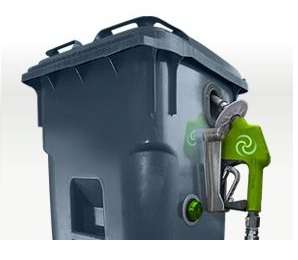Enerkem converts garbage into ethanol in a process that combines waste gasification and catalytic synthesis. Image credit: Enerkem.
(PhysOrg.com) -- For the past several years, Montreal-based company Enerkem has been working on a way to make ethanol from old utility poles and household garbage. Earlier this week, the company announced that they have received $60 million in new financing from the major independent oil refiner Valero and the trash-hauling company Waste Management. Total investment in Enerkem is now $130 million.
Enerkem is one of several companies working on transforming garbage into ethanol, a process that has often proven to be difficult and expensive. Ethanol made from garbage is a type of cellulosic biofuel, meaning it comes from cellulose, a non-food plant material. So compared to making ethanol from the starch in corn and grains, making cellulosic biofuels offers some advantages - most notably, it allows for a greater production of ethanol without using food sources.
Founded in 2000, Enerkem is currently operating a pilot plant and commercial-scale plant in Quebec. The company is also building commercial plants in Edmonton, Canada, with funding from the government of Alberta, and in Pontotoc, Mississippi, with a $50 million DOE grant. Each of those two plants would consume about 100,000 tons of garbage per year.
Enerkem’s technology works by shredding municipal solid waste and then heating it to 400° C (750° F). The waste gives off a gas that includes hydrogen and carbon monoxide, which are trapped while carbon dioxide and other impurities are filtered out. The pure gas is then run over a catalyst, which converts it into methanol. The methanol can then be converted into ethanol or other chemical feedstocks.
One of the biggest advantages of the technology is that it has significantly lower carbon dioxide emissions compared to making ethanol from corn. As Enerkem explains, its process requires burning natural gas or propane to start, but excess heat produced by the gasification process can be used to continue running the system by boiling water to generate electricity. Further, the process keeps trash out of landfills, where it can give off methane. Using garbage is also beneficial from an economic perspective: since Enerkem gets paid to dispose of the waste materials, its feedstock is “cost-negative.”
Although it’s still in an early phase, hopefully Enerkem can use these advantages to produce ethanol in a cost-effective way.
© 2010 PhysOrg.com




















